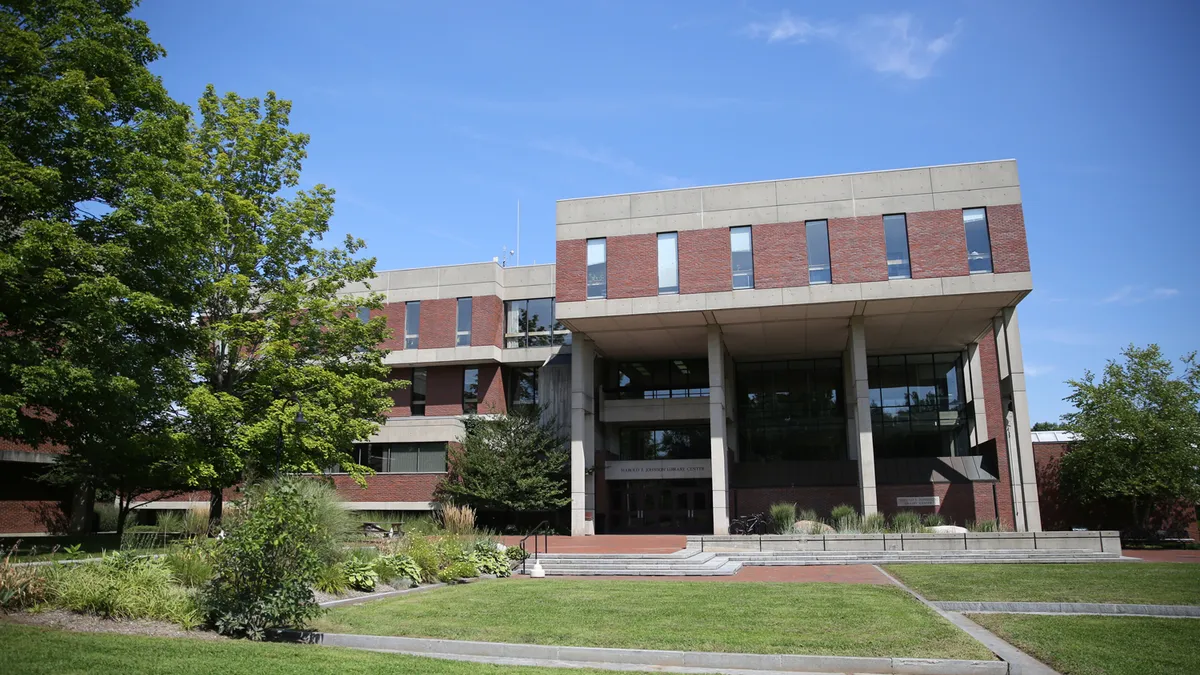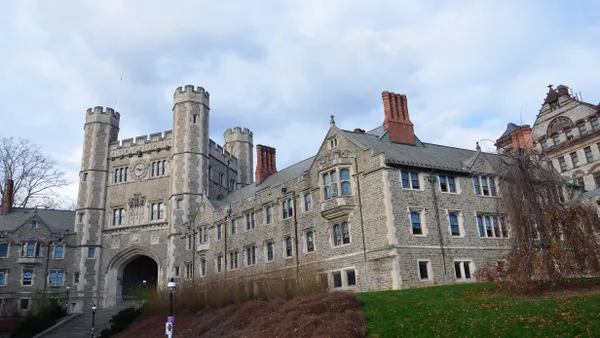UPDATE, Feb. 5, 2019: Hampshire College's Board of Trustees announced in a statement Friday that for the fall of 2019 it will admit only early decision applicants and students who deferred admission last year. It will not admit any applicants for the spring of 2020. "As a board, we're committed to preserving the educational mission that has made Hampshire so vital to so many young people and to the greater society over the last 50 years, as we create a new model to sustain us through the next 50 years and beyond," the members wrote.
Dive Brief:
- Hampshire College, the 49-year-old experiment that has trumpeted self-directed learning through a "graduate school model of undergraduate education," announced last month that it is seeking a partner to help it survive and may not admit a new class next year.
- President Miriam Nelson said in a letter to the college community that the Amherst, Massachusetts, institution had been "under-endowed" from its beginning. And like other small colleges, it faces "bruising financial and demographic realities," she said. A separate FAQ document stated the college will not close.
- Nelson said the college hopes to identify a partner by the end of the semester and will decide whether to admit a new class by its Feb. 1 admissions notification date. "We would progress into the 'new Hampshire College entity' in July 2020, following our 50th anniversary celebration," the FAQ notes.
Dive Insight:
The open discussion about a potential merger would give the college time to find the right partner, Nelson told WBUR in Boston. Other liberal arts colleges in New England have recently closed or merged. Among them is Mount Ida College, which shuttered abruptly last spring and is being sued by former students for not having revealed earlier that it was at risk of insolvency. Newbury College, near Boston, also announced last month it will likely close at the end of this academic year, joining a string of small colleges in that saturated higher education market to do the same.
Not all colleges are as vulnerable, however. Paul LeBlanc, president of Southern New Hampshire University, told WBUR that his institution's scale is helping it stay nimble. SNHU enrolls about 100,000 students, most of whom attend online. He was previously president of Marlboro College, in Vermont, with about 300 students. He said small colleges are more affected by issues such as enrollment declines because fixed costs remain despite declining income from student tuition.
Hampshire College enrolls around 1,400 undergraduates, accepting about two-thirds of applicants. Rather than taking up a formal major, students design their own multidisciplinary course of study and get narrative evaluations instead of letter grades. The college hopes to preserve this model through the transition, while "making it more accessible to a broader range of students," according to the FAQ. Hampshire lists its combine price for tuition, room and board at $63,636, with the average need-based grant at $35,941.
Across the country, small liberal arts colleges are shutting their doors or merging for the advantages of scale, according to Education Dive's tracker of consolidation in higher education.
A 2016 report from the Parthenon Group found 800 colleges vulnerable to "critical strategic challenges" because of their small size, a much larger share than among those with enrollments over 1,000. The report lists several common attributes of small colleges that put them at risk of closure: enrolling fewer than 1,000 students; depending on tuition for more than 85% of revenue; and the absence of online education programs.
For it's part, SNHU, a two-hour drive from Hampshire College, has become one of the country's largest providers of online postsecondary education. It also enrolls around 3,000 students at its Manchester, New Hampshire, campus.













